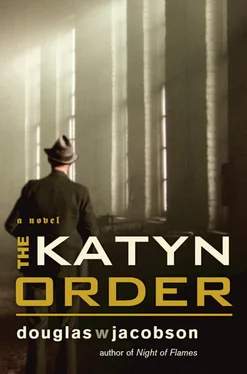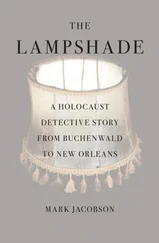Natalia hunched forward, wrapping her arms around her knees. “Berta was the only real friend I’ve had for years. We met in ’42 after an incident on the train that I had nightmares about for months afterward.” She paused and Adam could hear her breathing. When she continued, her voice was distant, as though she were far away. “I was punching tickets in one of the compartments and this thin, dark-haired girl—she couldn’t have been more than seven or eight years old—handed me her ticket. Two SS officers walked past the compartment. One of them stopped. He looked in and said, ‘]ude.’ Then he came into the compartment and grabbed the girl by her hair. He dragged her out, down the aisle to the end of the car. She screamed for her mother.” Natalia stopped and took a long, deep breath, trembling as though she were suddenly cold. “I will never forget that scream. Then he dragged her to the opening between the cars and… dropped her under the wheels.”
Natalia was quiet for a long time. When she continued again, her voice was barely a whisper. “The girl’s mother was hysterical. The other passengers had to hold her down. Finally the SS officer came back and he… he put his pistol to her head and shot her. I’d never seen anyone shot like that before! He ordered me to drag her body to the door and throw it off the train. I was so petrified, I couldn’t move, but one of the other passengers helped me. We dragged her body to the end of the car and just… threw her out.”
She sat back against the wall and wiped her eyes with the sleeve of her jacket. A tear trickled down her cheek, the purple welt now mostly obscured with a layer of dirt. “By the time the train arrived in Warsaw, I could barely function. Berta was the dispatcher. I hardly knew her, but she saw what a state I was in and took me to a café for coffee. She knew more than I did, about the Resistance, about refusing to bow down to the Nazis. We talked for a long time that day, and eventually we became friends. Whenever I needed to talk to someone, Berta was always there.” She turned her head toward Adam. “She was also an American.”
“Berta, an American…?”
“Well, she’d never actually been there, but her father was an American. Her mother was Polish. I’m not sure how they met, but they lived in Warsaw when Berta was born. Her last name was Andersen. It’s funny, she was one of the few people whose last name I actually know.” Natalia crossed her arms over her chest and shuffled her feet back and forth in the dust. “Do you know what that’s like, Wolf, to have someone you can talk to when you’re desperate and alone?”
Adam shook his head.
“Don’t you miss having a friend, someone you can talk to, someone you can share things with?”
“I don’t think about it.”
“Hah, that’s a lie!” she retorted. “Everyone wants a friend they can talk to. Even us, doing what we do in this lousy war, or we’re not human. I could talk to Berta, cry with her sometimes, laugh at other times, but she was always there.” She closed her eyes. “But not any more.”
The sounds of sporadic gunshots and artillery shells, muted by the thick stone walls, drifted into the cellar. Adam looked down at his dirt-caked boots. There was nothing he could say that would help. He’d seen so much death and destruction—much of it by his own hand—that he knew he was far too jaded to be of any comfort.
But there was something about this woman. Something he hadn’t seen before. She was tough, of that he was certain, and she’d certainly seen her share of the same death and destruction that he had. But there was a difference. She still cared enough to mourn the loss of her friend. Maybe she still had a soul.
Natalia hunched forward and wrapped her arms around her knees again. She cocked her head. “Tell me about America.”
“America?”
“Yes, you’re an American, so tell me about it.”
His mind was suddenly blank, caught off guard by the incongruous question. “I don’t understand. What do you want to know?”
Natalia threw her hands in the air. “God, this is like pulling teeth. I’m not asking for state secrets, Wolf. I’m making conversation. Where did you live? What did you enjoy doing? What kind of food do Americans eat? It’s better than talking about dying, isn’t it?”
Adam squirmed, more than a little uncomfortable under the glare of Natalia’s penetrating eyes. What was it about her that could so easily throw him off stride? “It’s just a question I haven’t been asked for a long time.”
“Well, I’m asking you. We’re going to be here for awhile, and anything is better than just sitting here listening to the damn artillery shells.”
“I lived in Chicago.”
“Chicago? OK, good, that’s a start. That’s somewhere in the middle, isn’t it?”
He smiled in spite of himself. “It’s what we call the Midwest. It’s a big city, bigger than Warsaw. There’s more than a half-million Poles living there.”
“A half-million Poles? In Chicago?”
“There’re also Germans, Czechs, Irish—immigrants from all over.”
“Do they get along with each other: the Germans, the Czechs and the Poles?”
Adam nodded. “Sure, I mean they kind of live in separate neighborhoods, but it’s not like it is here. Many of them work at the same factories or offices, and there’s just so many people in Chicago that… well, I guess everyone just sort of blends in.”
“Are there any Jews?”
“Chicago has the largest Jewish population in the Midwest. A lot of them live in a suburb on the northwest side called Skokie.”
“How are they treated?”
Adam shrugged. “It’s kind of hard to describe. They pretty much keep to themselves, some people make jokes about them, there’s some discrimination—not like with the Negroes—but they all work or keep shops and live pretty much like everyone else.”
“You said, ‘Negroes’… like Jesse Owens?”
Adam laughed. “Well, he’s not from Chicago, but yes, they’re black, like he is. They mostly live on the south side, and a lot of people in Chicago don’t like Negroes. It’s hard for them to get jobs; they have separate schools and churches. I lived in a neighborhood called the ‘Polish Downtown’ on the northwest side of the city. There weren’t any Negroes there.”
“I’ve heard that Negroes aren’t allowed in your army.”
“That’s not true, but… they have separate units. It’s better that way.”
“Why?”
He thought about it. Why indeed?
“And they were once slaves, isn’t that right?”
“That was a long time ago—”
“Then America really isn’t so much different from here, is it?” Natalia tensed as an artillery shell burst nearby, and the lantern flickered. Bits of plaster drifted down from the ceiling, and she brushed them from her hair. “I’m sorry. I ask too many questions.”
He smiled at her. “Your worst quality?”
She smiled back. “I think we’ve had this conversation before. OK, no more questions.”
“No, it’s fine. Really, I don’t mind.”
“Then tell me about your neighborhood, this ‘Polish Downtown’ in Chicago.”
Adam paused as the memories slowly drifted back. It had been a long time since he’d thought about those days: when his father was alive, when he had some friends, when life seemed very simple. “My neighborhood reminded me a bit of where we lived in Krakow, except that it was bigger and noisier, more motorcars and trucks, more people. And the trams run on tracks high above the streets.”
She looked perplexed, as though trying to imagine trams running above the streets, but Adam continued as it all came back, the wonderful, vivid memories of a young immigrant boy growing up in Chicago, becoming American. “But there were Polish food stores and cafés in our neighborhood. We had pierogi and galumpki and kiel-basa. We had festivals in the summer where they played polkas in the afternoon and Chopin in the evening. But the best part was the Coca-Cola.”
Читать дальше












